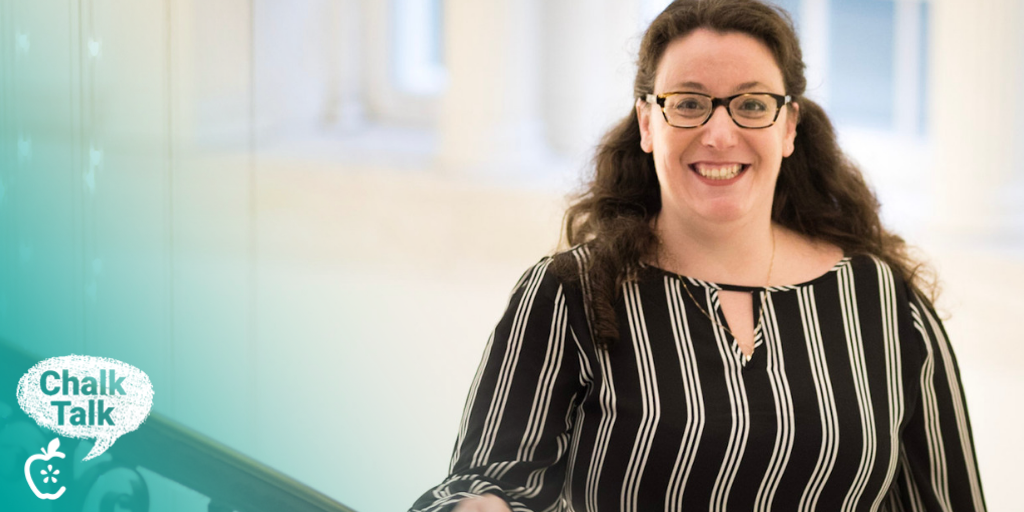July 8, 2019
Chalk Talk: Rachael Goeler

“I entered the profession cockier than I should have,” Rachael Goeler said unequivocally and with a hint of remorse when remembering that first year in her Queens classroom 9 years ago.
A vocational and living skills teacher for autistic students ranging from 12-21, Rachael had been working in special education since she was 14 years old, long before she first entered our profession. Yet, like most of us teachers, she still couldn’t conceive of the challenges she was about to face.
“Since I was a freshman in high school I had worked in special education with students ranging from two years old to end of life, all with a wide range of physical and mental disabilities. Now that I had my formal teacher training, I thought there was nothing I hadn’t seen before. I was wrong. While I felt more prepared to be around people with disabilities, love them for who they are, and work through behavior issues, I had not a clue how to set up and run a classroom.”
While a few first-year teachers flourish upon entering the classroom, most flounder quite a bit in the beginning. The fact is that teacher preparation programs do not adequately train teachers to confront the challenges of leading a classroom — especially those serving highest need students. Only 34 percent of teachers feel their preparation program adequately prepared them for the classroom.
These are the questions she and her colleagues set to answer in their 2019 policy paper Ready for Day One and Beyond. The report outlines concrete steps that New York and other communities can take to ensure every student has a successful teacher at the head of their classroom. Of the recommendations ranging from practices to recruit a diverse teacher workforce to improving access to professional development that doesn’t suck, Rachael’s favorite asks would make that time teachers spend preparing for the classroom meaningful.
“Too much preparation is spent on theory instead of practical experience. We want — we need — to get our hands dirty.” -Rachael Goeler, #E4ENY member #teacherprep
“Too much preparation is spent on theory instead of practical experience. Professors are like, ‘Here is how you teach reading, now write a paper on it.’ We want — we need — to get our hands dirty. We think training teachers should take a page from the medical model and allow prospective educators to apprentice in a classroom for a full year. This way you have support when you have mountains of paperwork you’ve never seen before or you need to run triage when students are having a meltdown. As they are, grad classes can’t prepare you for the day you step into a room and everything you planned goes out the window. I learned more in the first week on the job than two years of grad school.”
Does that ring a bell? It should. Rachael is just one of a long line of teachers who have been asking to actually be prepared for the classroom.
In addition to shaping the education landscape for future students and teachers, writing this paper had a more personal impact on Rachael.
“Besides giving me a voice so I become a much less combatively angry person, writing this paper gave me a lot of skills. And working with teachers around the city gets me out of my small bubble where I talk to the same people and hear the same opinions every day. I grow when I hear from these other teachers.”
But more than for pushing solutions beyond the classroom, Rachael believes it’s this passion for learning that sustains her teaching.
“Sometimes we, as teachers, get scared when we look at our observations and see ‘developing’ – we can feel like failures. But we should always be developing.” -Rachael Goeler, #E4ENY member
“Sometimes we, as teachers, get scared when we look at our observations and see ‘developing’ – we can feel like failures. But we should always be developing. There will always be new things to learn and innovate, strategies that come down the pipeline to match the ever-changing realities of the classroom. Not that we should always reinvent the wheel, but we should be like our students and always have a passion to grow and be the best we can.”
Spread the Word
Share this article with your friends and colleagues on Facebook and Twitter!
Currently Reading
Chalk Talk: Rachael Goeler